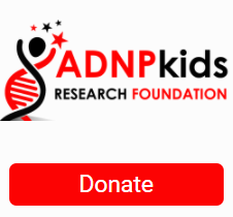HERE ARE STEPS TO TAKE NOW
This is a difficult time, and you may question where to begin. As you are navigating this new diagnosis, here are some steps you can take to get informed, connected, and make an impact today!
This is a difficult time, and you may question where to begin. As you are navigating this new diagnosis, here are some steps you can take to get informed, connected, and make an impact today!
- Stay up to date on the latest ADNP Syndrome news by joining our Contact Registry. You will need to know your genetic diagnosis in order to complete the registration. Here is a video on how to read your genetic report. If you have difficulty, we can help you.
- Connect with other ADNP Syndrome families by joining the private parent ran Facebook support page noted below (#5)
- Help researchers & our community better understand ADNP Syndrome by registering for our SHARE because you CARE Patient Registry for the ADNP Syndrome long term natural history study.
- Help raise awareness, follow us on Facebook & Instagram
- Join the ADNP International Parent Support Facebook page.
Sign up for our Contact Registry
Registering with ADNP Kids Research Foundation will help to keep you up-to-date on the latest information regarding ADNP Syndrome.
Contact Registrants will be informed about opportunities to participate in research with our international research partners around the world. You will also receive family meeting announcements, special mailings, and information regarding discoveries about ADNP Syndrome that could impact care decisions.
Registering with ADNP Kids Research Foundation will help to keep you up-to-date on the latest information regarding ADNP Syndrome.
Contact Registrants will be informed about opportunities to participate in research with our international research partners around the world. You will also receive family meeting announcements, special mailings, and information regarding discoveries about ADNP Syndrome that could impact care decisions.
DOES IT MATTER WHAT TYPE OF MUTATION YOU HAVE?
There are many types of mutations found in ADNP. We have two particular mutations, c.2157 and c.2188, that has a very large cohort of patients with the same mutation. We have nonsense, missence and frameshift mutations, as well as whole or partial gene deletions.
It has recently been discovered that ADNP is one of the only known genes to have 2 DNA methylation types. The different methylation types surprising does not show a difference in disease phenotype.
There are many types of mutations found in ADNP. We have two particular mutations, c.2157 and c.2188, that has a very large cohort of patients with the same mutation. We have nonsense, missence and frameshift mutations, as well as whole or partial gene deletions.
It has recently been discovered that ADNP is one of the only known genes to have 2 DNA methylation types. The different methylation types surprising does not show a difference in disease phenotype.
IS ADNP SYNDROME INHERITED?
Almost all ADNP mutations have been found to be de novo, meaning new in the individual and are not present in either parent.
However, there is a small growing group of hereditary cases recently being identified, so if your child has been diagnosed, it is important to speak to your genetic physician if the parents have not been tested,
Almost all ADNP mutations have been found to be de novo, meaning new in the individual and are not present in either parent.
However, there is a small growing group of hereditary cases recently being identified, so if your child has been diagnosed, it is important to speak to your genetic physician if the parents have not been tested,
IS THERE ANY GENDER BIAS?
ADNP Syndrome affects both makes and females
ADNP Syndrome affects both makes and females
THERAPY OPTIONS CURRENTLY AVAILABLE:
- Intense therapy can help ADNP patients improve their skills and reach milestones. Families are encouraged to seek out professionals who have a large amount of experience working with children with complex global neurodevelopmental disorders and autism.
- The most common therapies available are Physical Therapy, Occupational Therapy, Speech Therapy, Developmental Therapy and Applied Behavior Analysis (ABA) Therapy.
- ADNP patients respond well to alternative therapies including PROMPT therapy, hippotherapy, aqua therapy, music therapy, etc.
HOW CAN I LEARN ABOUT FUTURE STUDIES?
You can join our Contact Registry if you are a patient or caregiver of a patient with ADNP Syndrome, and we can let you know what a future study is looking for participants, including international studies.
You can join our Contact Registry if you are a patient or caregiver of a patient with ADNP Syndrome, and we can let you know what a future study is looking for participants, including international studies.

